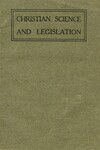

Are you sure?
This bookmark will be removed from all folders and any saved notes will be permanently removed.
"Thou shalt not kill."
Recently there has been a renewal of the proposition advanced some time ago, that it is legitimate and humane to cut short the lives of sick persons who have been pronounced incurable; and the most astonishing thing regarding this proposition is that it has found advocates in the ranks of those who have earned by their works the reputation of being humanitarians. The proposition has, of course, met with very general protest and denunciation upon moral grounds, but there is another side of the question which has not entered largely into the discussion, as it has been carried on in the newspapers, and that is, the fallibility of human judgment in the matter of disease. Who will dare say, even from the standpoint of long experience in the practice of medicine, that any disease is incurable; and what physician is there of any considerable practice who has not seen a patient get well after he had diagnosed the case as a hopeless one? Who will take the responsibility of saying that if a sick man cannot be healed by drugs or surgery he cannot be healed at all? Certainly there is no justification for such a conclusion, and this is becoming more and more apparent each day. Of the thousands who have been healed by Christian Science a very large proportion had previously been pronounced incurable by their physicians. These people are alive to-day and are healthy and useful citizens. In the light of subsequent events, would it not have been worse than a crime to "put them out of their suffering," in the manner proposed by these new-school humanitarians? A case in point is that of Mr. Ephraim D. Mann of Savannah, Ga., whose experience, as described by himself, is given in a pamphlet called "Christian Science and Legislation," recently issued by The Christian Science Publishing Society. Mr. Mann details his experience as follows:—
"Twelve years ago I was in a hopeless state of ill health. For twelve years I was afflicted with pulmonary disease, and during the above stated period, tried every remedy known to materia medica, with no permanent relief. I was twice carried to the operating-table, my uncle, Dr. Edman Fitzgerald, of Macon, Ga., being chief surgeon at these operations. After the second operation, Dr. Fitzgerald told my mother that the operation had disclosed the fact that my left lung was entirely gone, and the right lung was so badly affected by tuberculosis that it was impossible for me to recover.
"I had pneumonia four times after the last operation, and was never known to be free from a cough or cold. I was attended by six prominent physicians of the State of Georgia, each one concurring with the others in the diagnosis of my case as being hopeless. I was also informed that my kidneys were diseased.
Enjoy 1 free Sentinel article or audio program each month, including content from 1898 to today.
JSH Collections
This article is included in:
1909 - PAMPHLET
Christian Science and legislation
JSH-Online has hundreds of pamphlets, anthologies, and special editions for you to discover.

January 20, 1906 issue
View Issue-
Only One Christian Science
SAMUEL GREENWOOD.
-
Readiness
J. S. B.
-
What the Truth Will Do
IDA G. STEWART.
-
His Own are Fed
KATHERINE J. SMITH.
-
Classification of Christian Science Literature
Frank W. Gale
-
Among the Churches
with contributions from J. R. Bertholf
-
The Lectures
with contributions from Mayor Barnard, T. E. Webber, J. T. Morrison, J. Heugh, A. L. Chase
-
MRS. EDDY TAKES NO PATIENTS
Editor
-
A Generous Gift
Albert E. Pierpoint
-
"Thou shalt not kill."
Archibald McLellan
-
Liberation
Annie M. Knott
-
A Channel for the Waters
John B. Willis
-
Letters to our Leader
with contributions from Richard P. Verrall, E. Warner, Mary Louise Wright, Ivah Fager, Harriette S. March
-
About three years ago I was healed at once of rheumatism,...
Edith C. Damewood
-
Having been greatly benefited by Christian Science, I wish...
Harry C. Taylor
-
I was told by my doctor that I had at the longest about...
Katherine Hall
-
As I look back over eight years of health and peace, I...
William Betzel
-
It was in 1892 that I first heard of Christian Science
Lizzie McKibbin
-
It is with a heart full of love to God, and to our dear...
Lillian A. Niemann
-
When I was three years old. I had scarlet fever and...
Angeline Uhlmann
-
I was raised in Denmark, in the State Church, and the...
Hansine Madson
-
Words are not adequate to express my gratitude for...
Alice Marian Adams
-
Although I am but a novice in the study of Christian Science,...
Marion S. Cemer
-
The study of Christian Science has enabled me to overcome...
Stella Ralston
-
I wish to express my heartfelt gratitude to God, and to...
Clara A. Seyffert
-
The Ever-coming Christ
C. VIOLET SPILLER.
-
From our Exchanges
with contributions from Frederic W. Perkins, C. T. Winchester
-
Notices
with contributions from Stephen A. Chase


